Hello, Ladies and Gentlemen!
My name is Sergey Lang, and I want to share a deeply personal story from my life. This story highlights the importance of maintaining one’s humanity in the face of adversity, no matter the circumstances.
A New Beginning in Germany
I moved to Germany to be with a woman I had met online. We were married for five years and lived together for an additional two years without being officially married. In total, we were together for nearly seven years.
The Onset of Illness
It all started three years ago when I was admitted to the neurology department. There, doctors discovered that I had a congenital disorder known as Arnold-Chiari malformation type II. This rare disorder affects the brain and spinal cord and can lead to serious complications if not treated properly. The condition began to worsen and doctors informed me that I needed urgent surgery. They recommended that I undergo brain surgery as soon as possible, specifically a craniotomy, which is a surgical procedure in which part of the skull bone is removed to access the brain.
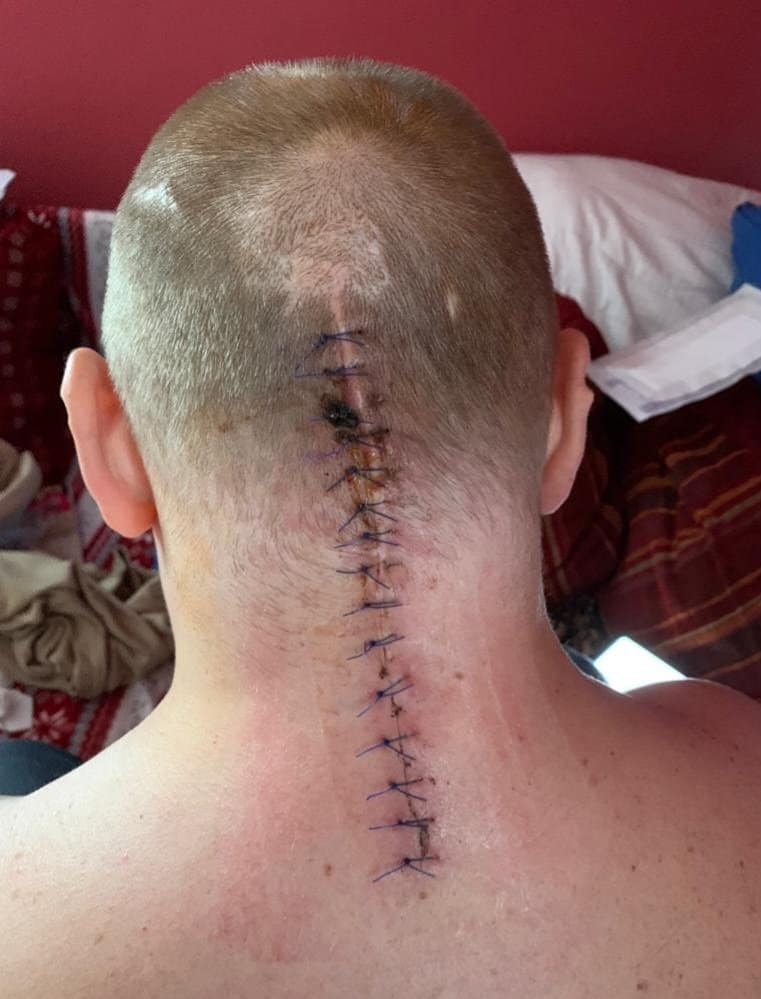
First operation
On my birthday, I traveled to Mainz for the surgery, accompanied by my wife. At that time, I was still able to walk, run, eat, and talk without significant difficulties. On June 16th, the surgeons performed the operation, but I was discharged five days earlier than anticipated. Essentially, they sent me home prematurely.
Complications and a Second Surgery
A couple of days later, the stitches on my head began to split apart. When we sought help from the hospital, they refused to assist me. It was a weekend, and most pharmacies were closed, making the situation even more challenging. My wife, determined to help, eventually found a doctor who agreed to see me. He bandaged my head and provided us with a substantial amount of cotton and adhesive tape so we could frequently change the dressings ourselves.
As the wound continued to leak cerebrospinal fluid, we realized the situation was dire. The pillows at home were soaked within an hour due to the persistent leaking, even though my wife changed my dressings every half hour. When we arrived at the rehabilitation center (REA), I could barely walk. I was taken to a ward for recovery, where a female doctor examined my wound. She noticed the significant leakage of brain fluid and called an ambulance to take me back to Mainz for a second surgery.
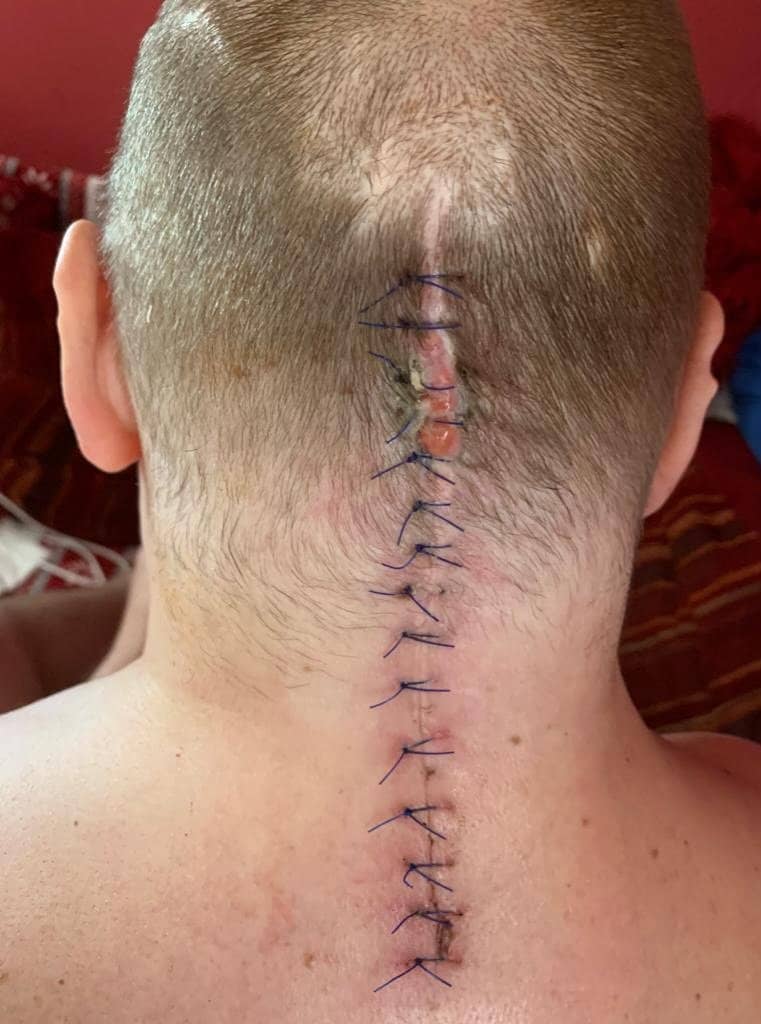
Life in the hospital
At the hospital in Mainz, I was placed in a filthy room that seemed more suited for homeless people. My condition worsened. I shared the room with an elderly man who was incontinent, and the smell was unbearable. Despite this, he made efforts to reach the bathroom on his own, as the nurses were rarely available. During one of his attempts, he fell near my bed. Struggling with my own pain, I managed to get up and assist him until a nurse finally arrived. She helped us both, changing my soaked bandages and providing some relief.
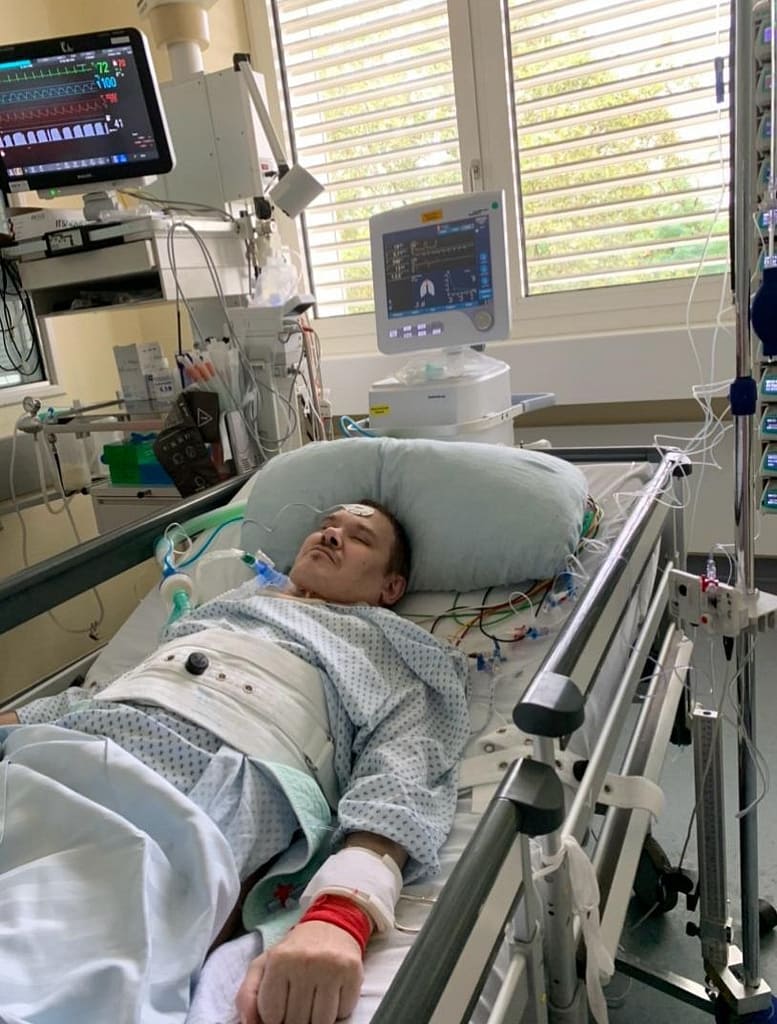
Rehabilitation and failures
After the second surgery, I was sent back to the rehabilitation center. There, I learned to walk with a rollator (a walking aid with wheels) and navigate using a wheelchair. Ten days into my rehabilitation, a speech therapist decided to examine my swallowing function. They inserted a tube through my nose and observed on a monitor how I ate and drank, paying particular attention to my swallowing. Unfortunately, after this procedure, I could no longer swallow normally. They inserted a feeding tube through my nose, and I was transferred to a military academy for further evaluation and treatment of my swallowing issues.
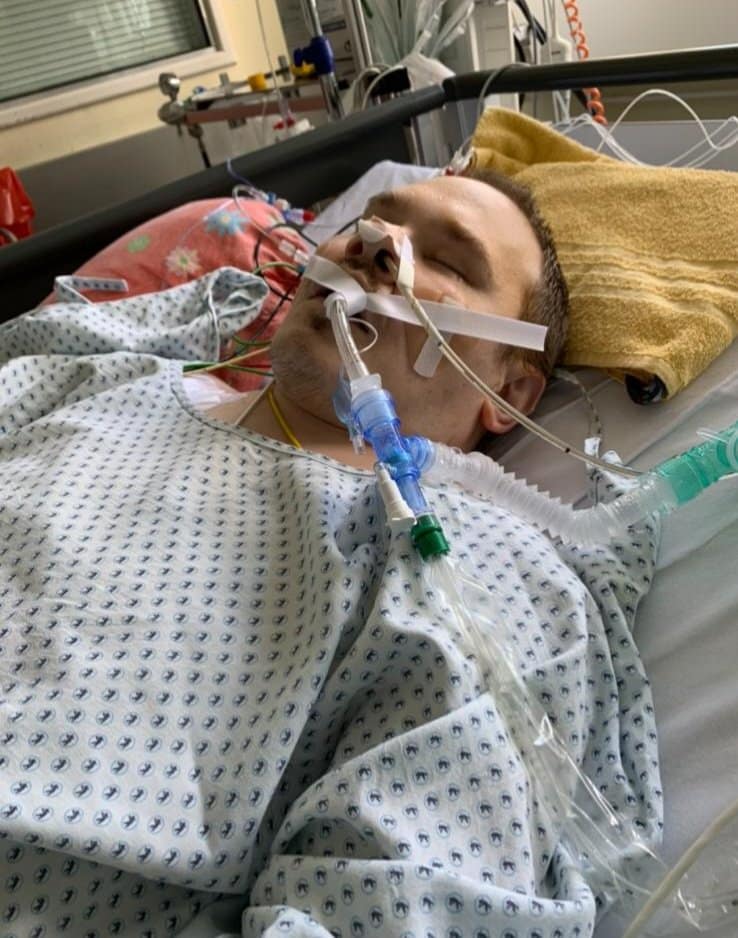
Third operation
Despite various examinations at the military academy, the doctors decided not to take any immediate action and instead referred me back to Mainz for a third craniotomy.
Two months passed before the third surgery could be performed. During this time, I underwent numerous distressing tests. One particularly excruciating procedure involved hanging me upside down for fifteen minutes while they extracted a spinal puncture. Afterward, they injected something into my spine while shaking me repeatedly. The pain was excruciating, and I could barely move afterward.
Finally, the third surgery took place. However, my condition continued to decline. I accidentally bit through my feeding tube one morning, causing a portion of it to fall into my stomach. When my wife visited, she helped me wash and change, and during a visit to the bathroom, I began urinating dark blood. We were both terrified, but I tried to remain composed for her sake. A nurse quickly responded to our calls for help and managed to stop the bleeding. However, my wife had to leave for her night shift at work, despite her fears and worries about my condition.
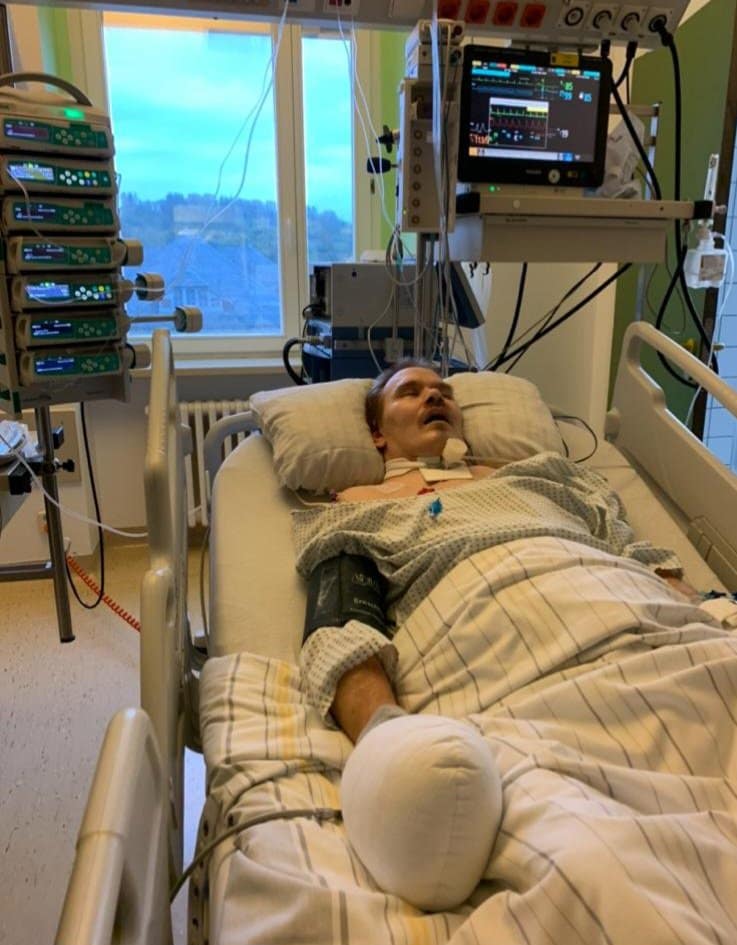
Intensive care and fourth operation
After the bleeding stopped, I was transferred to the intensive care unit (ICU). In the ICU, I was placed in a room where a nurse started an IV and a male nurse administered various medications. I passed out and woke up on an operating table surrounded by medical staff. A familiar professor greeted me before I passed out again. When I woke up again, I was hooked up to several tubes with dark blood flowing through them. I felt separated from my body and one of the tubes came loose, causing the blood to spill out. The nurse quickly changed the blood-soaked bed linen and tended to me before I passed out again.
I slipped into a coma that lasted three months. During this time, I underwent a fourth surgery, and I suffered a stroke, which left my entire left side paralyzed. When I finally awoke, I found myself surrounded by a group of Germans. Initially, I thought I had somehow traveled back to 1943. Among the group was a terrifying man with a red beard and Nazi tattoos on his bald head. They spoke in German, and I struggled to understand what was happening. When they left, I had a moment to take in my surroundings. I couldn’t speak due to a tube in my throat, and my body was connected to various machines.
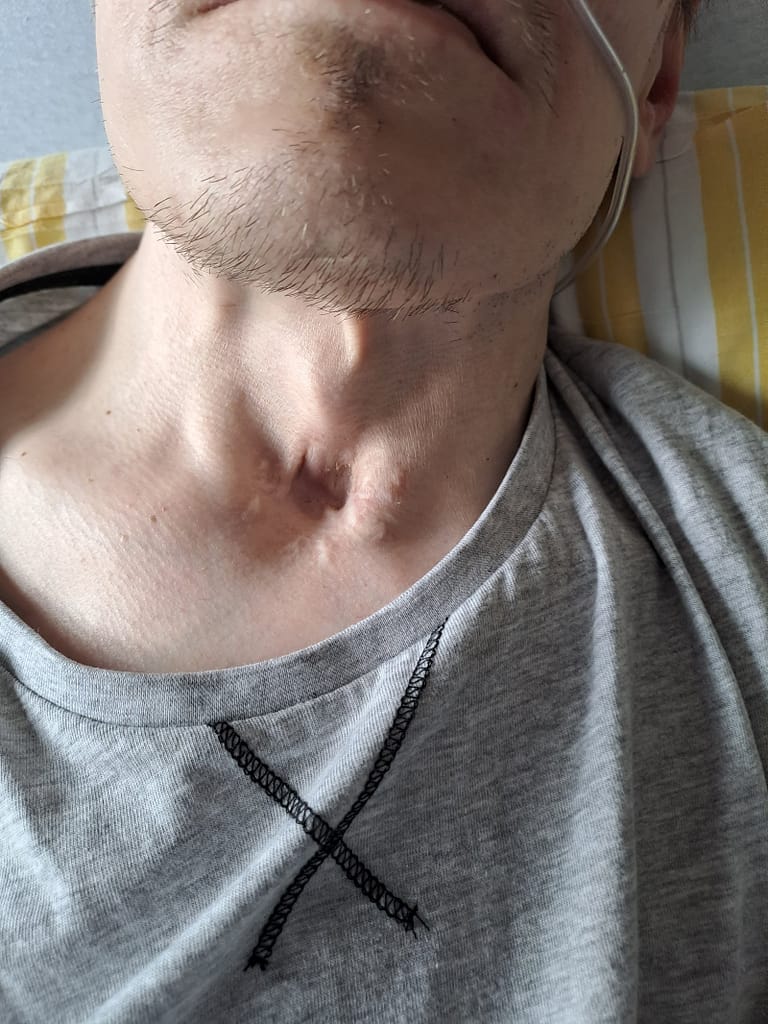
Coming to terms with reality
My wife explained that after I started urinating blood, I was transferred to the intensive care unit, where the professor performed two surgeries. During the third surgery, I had a stroke, paralyzing my left side. They inserted two plates into my head, and I was flown to this hospital by medical helicopter. Since then, I have been to many hospitals, and each stay has been filled with its own problems and complications.
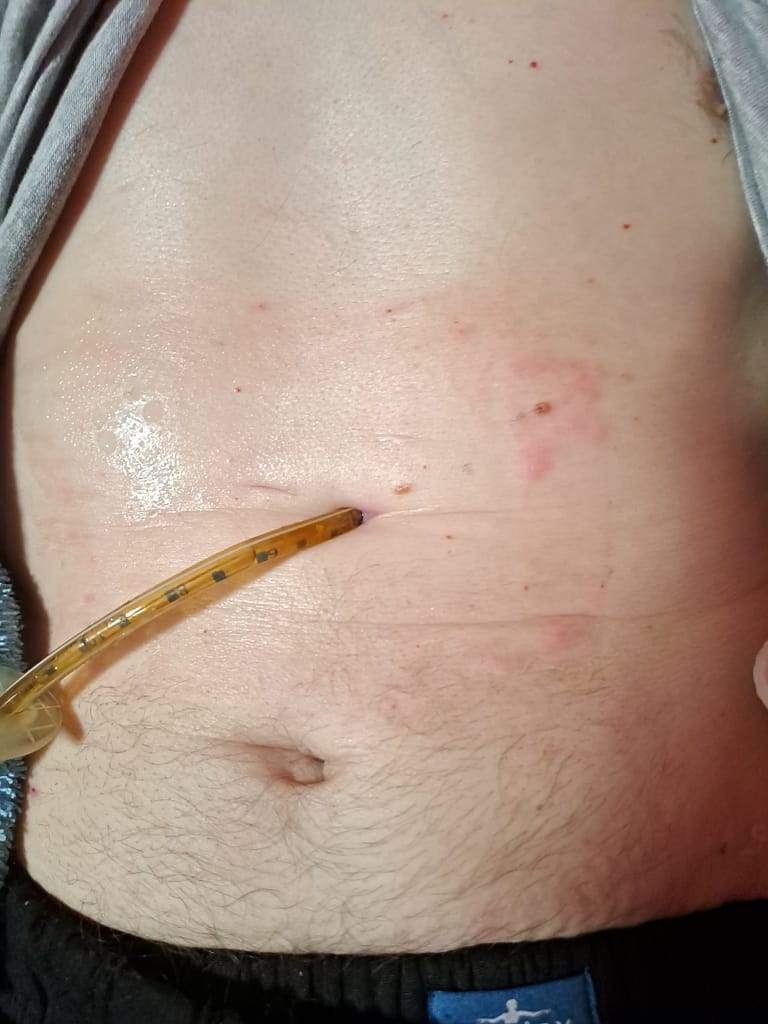
Damage to my body
In summary, I endured four brain surgeries (craniotomies), a stroke that left me paralyzed on one side, and an operation on my leg to create a new flap in my throat. I had feeding tubes inserted multiple times, and I currently have a feeding tube that exits through my abdomen. I also had a stent placed in my heart, suffered from severe blood poisoning (98% sepsis), contracted COVID-19 with 97% lung involvement, and experienced three clinical deaths, from which I was resuscitated using defibrillators.
Now, I am unable to walk (I rely on a wheelchair), speak (my vocal cords are damaged or severed), or eat regular food (I am fed and medicated through a tube).
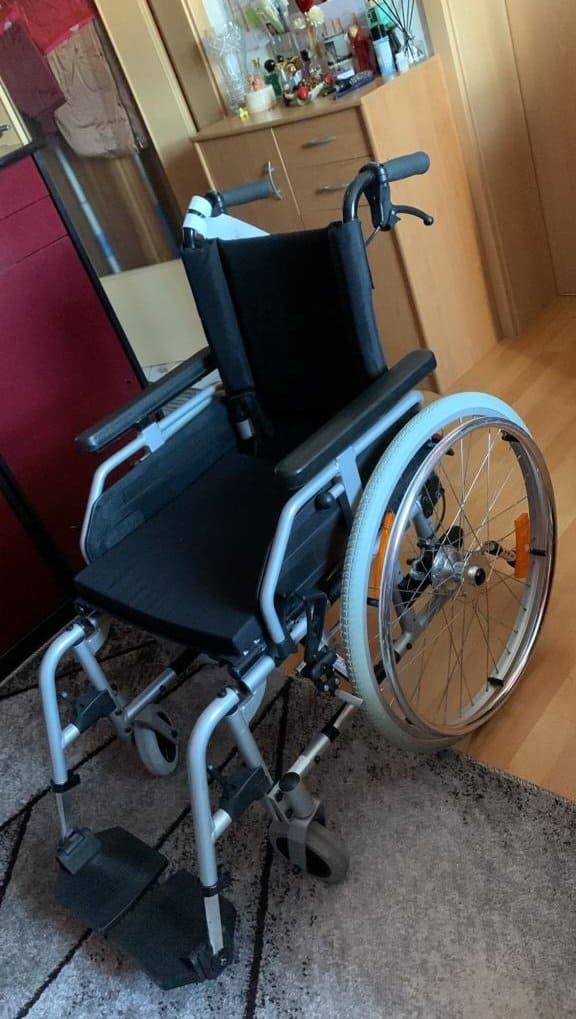
Recourse
I need full-time home care and a vehicle that can accommodate my wheelchair.
Вот мой номер кошелька PAYEER
:
Р1055186933
Any amount, even 5-10 euro, can make a significant difference. You can donate from any card, including MIR cards.
Thank you all for your help. I wish you and your families good health.
If you are interested in more details about my experiences or need any medical documents and records, I can provide them upon request. However, please note that these documents are in German.
This expanded version of my story not only highlights my medical struggles but also emphasizes the resilience and support I received from my wife and the importance of remaining humane in the face of adversity. Your assistance can make a significant difference in my life. Thank you once again for your kindness and support.